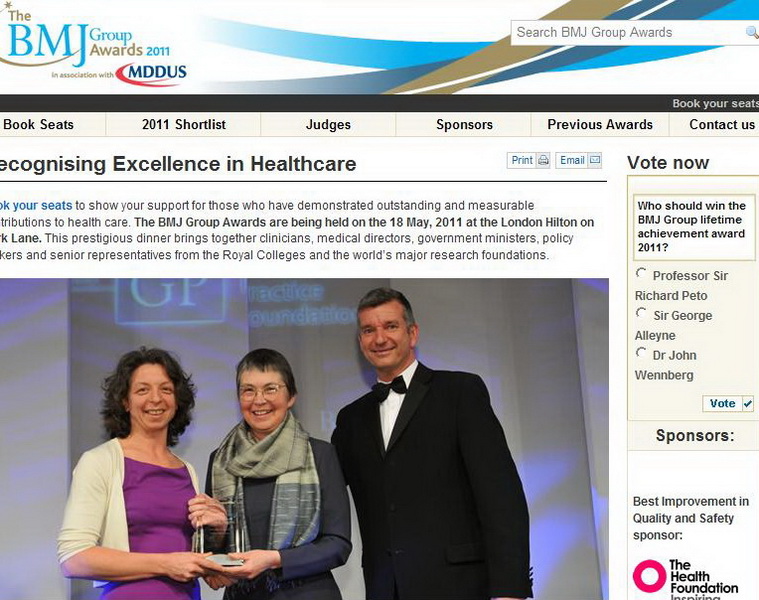|
關心菸害防制工作的先進,大家好!
被喻為菸草工業最怕的人~Dr. Judith Mackay特別來函推薦
<< Professor Sir Richard Peto >>
角逐BMJ終身成就獎(British Medical Journal Lifetime Achievement Award)提名.
Richard Peto是Judith Mackay一起在中國及亞太地區做菸害防制工作的夥伴,也是
世界知名的流行病學家,倫敦牛津大學教授。
以下是Judith Mackay對Richard Peto的個人推薦:
Richard Peto對於拯救生命有極重的使命感,他是個科學家,他相信在公共政策倡議上運用科學數據佐證是很重要的。不只如此,在中國,及其他中低收入國家,他更付諸行動。他善於向決策者、媒體和一般民眾解釋流行病學數據,許多國家因為他的協助在公共衛生政策上有很大的改變及突破。
他奉獻自己一生在許多大議題上,他相信在一個大族群裡儘管是在小小的改變卻能拯救許多的生命,就像是慢性疾病、癌症及菸害防制。
懇請大家4/9前,
百忙中撥冗上BMJ的網頁投票-支持及肯定Richard Peto長期來對亞太地區菸害防制的付出與貢獻.
投票請上BMJ website : http://groupawards.bmj.com/
右邊有一個方框寫"Vote Now"就可以投票了。
一個IP位置只能投一次。

BMJ website 上Richard Peto的簡介
>
> Professor Sir Richard Peto (from BMJ site)
>
> Richard Peto, epidemiologist and statistician, has contributed much to the
> decrease in neoplastic, vascular, and respiratory mortality from smoking,
> both in the UK and elsewhere.
>
> Currently codirector of the Clinical Trial Service Unit and
> Epidemiological Studies Unit (CTSU) at the University of Oxford, Professor
> Peto demonstrated (in collaboration with Richard Doll) the extraordinary
> extent to which the hazards of persistent cigarette smoking exceed those
> from the aggregate of all other known causes of cancer.
>
> He also showed that for those who manage to stop smoking before age 30 or
> 40, the eventual long term benefits of cessation are far greater than had
> previously been thought and thus has effectively argued the importance of
> cessation in the UK and many other countries. This has had, and continues
> to have, a direct influence on public policy a
> After gaining a BA in natural sciences from the University of Cambridge in
> 1965 and an MSc in statistics from the University of London in 1967,
> Professor Peto began to work on chronic disease epidemiology with
> Professor Doll and Charles Fletcher.
>
> In 1976, 1994, and 2004, Professors Doll and Peto published the 20 year,
> 40 year, and 50 year follow-ups of the study of smoking and death among
> British doctors, and in 1981 they published their quantitative report, The
> Causes of Cancer, which gained worldwide attention.
>
> Also in 1981, Professor Peto’s close collaboration with Rory Collins on
> large scale randomised evidence began, and since 1985 they have codirected
> CTSU, which conducts large studies of the causes and treatment of disease
> worldwide.
>
> During the 1980s they introduced large simple trials, meta-analyses of
> trials, and correction of epidemiological studies for regression dilution
> bias, which showed that the real importa
> A substantial part of Professor Peto’s epidemiological work has been, and
> still is, in China (where he led a study that interviewed the families of
> one million people who had died during the 1980s, assessing their smoking
> habits), India (using similar methods), and Russia (where his large
> studies with David Zaridze confirming the massive mortality from alcohol
> have recently helped lead to effective controls).
>
> During the 1970s, Professor Peto introduced the logrank test for analyses
> of trials and for meta-analyses of trials, particularly those of cancer
> treatments.
>
> The Early Breast Cancer Trialists』 Collaborative Group, which he founded
> in 1985 and still leads, brings together worldwide randomised evidence and
> has contributed much to evaluating and consolidating the improvements in
> treatment that have helped decrease UK breast cancer mortality since the
> 1980s. This decrease is now steep in many countries but is steepest in the
|